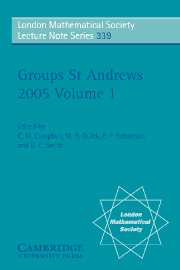Book contents
- Frontmatter
- Contents
- Introduction
- Aspects of infinite permutation groups
- Self-similarity and branching in group theory
- On surface groups: motivating examples in combinatorial group theory
- Nilpotent p-algebras and factorized p-groups
- Classification of finite groups by the number of element centralizers
- Algorithmic use of the Mal'cev correspondence
- Minimal but inefficient presentations for semi-direct products of finite cyclic monoids
- The modular isomorphism problem for finite p-groups with a cyclic subgroup of index p2
- On one-generated formations
- New results on products of finite groups
- Radical locally finite T-groups
- Explicit tilting complexes for the Broué conjecture on 3-blocks
- Conjugacy classes of p-regular elements in p-solvable groups
- An algorithm for the unit group of the Burnside ring of a finite group
- Integral group ring of the first Mathieu simple group
- Embedding properties in direct products
- Malcev presentations for subsemigroups of groups — a survey
- Finite groups with extremal conditions on sizes of conjugacy classes and on degrees of irreducible characters
- Conjugacy class structure in simple algebraic groups
- On automorphisms of products of groups
- Linear groups with infinite central dimension
- G-automata, counter languages and the Chomsky hierarchy
- An embedding theorem for groups universally equivalent to free nilpotent groups
- Irreducible word problems in groups
- Recent growth results
Irreducible word problems in groups
Published online by Cambridge University Press: 07 May 2010
- Frontmatter
- Contents
- Introduction
- Aspects of infinite permutation groups
- Self-similarity and branching in group theory
- On surface groups: motivating examples in combinatorial group theory
- Nilpotent p-algebras and factorized p-groups
- Classification of finite groups by the number of element centralizers
- Algorithmic use of the Mal'cev correspondence
- Minimal but inefficient presentations for semi-direct products of finite cyclic monoids
- The modular isomorphism problem for finite p-groups with a cyclic subgroup of index p2
- On one-generated formations
- New results on products of finite groups
- Radical locally finite T-groups
- Explicit tilting complexes for the Broué conjecture on 3-blocks
- Conjugacy classes of p-regular elements in p-solvable groups
- An algorithm for the unit group of the Burnside ring of a finite group
- Integral group ring of the first Mathieu simple group
- Embedding properties in direct products
- Malcev presentations for subsemigroups of groups — a survey
- Finite groups with extremal conditions on sizes of conjugacy classes and on degrees of irreducible characters
- Conjugacy class structure in simple algebraic groups
- On automorphisms of products of groups
- Linear groups with infinite central dimension
- G-automata, counter languages and the Chomsky hierarchy
- An embedding theorem for groups universally equivalent to free nilpotent groups
- Irreducible word problems in groups
- Recent growth results
Summary
Abstract
In this paper we consider irreducible word problems in groups. In particular, we look at results concerning groups whose irreducible word problem lies in some given class of languages (such as the class of finite languages or the class of context-free languages).
Introduction
In this paper we look at irreducible word problems in groups; see Section 4 below for the definition. We are particularly interested in connections with formal language theory; to be more specific, we consider which types of group can have their irreducible word problem lying in some given class of languages (such as the class of finite languages or the class of context-free languages).
We summarize what we need from formal language theory in Section 2. The general question of the connection between irreducible word problems and classes of languages follows on from the analogous question concerning the links between word problems and classes of languages, and we look at some relevant information in Section 3. We come to reduced and irreducible word problems in Section 4, and we talk there about groups with a finite irreducible word problem. We mention some general results about irreducible word problems and languages in Section 5, and then, in Section 6, concentrate on groups whose irreducible word problem is context-free. We finish with some further comments in Section 7.
- Type
- Chapter
- Information
- Groups St Andrews 2005 , pp. 327 - 340Publisher: Cambridge University PressPrint publication year: 2007
- 1
- Cited by



